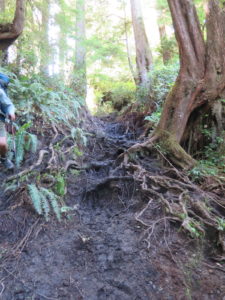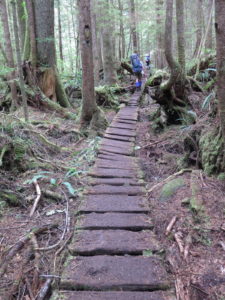 Last summer some friends and I hiked the West Coast Trail. For those of you who are not familiar with this piece of real estate, it is something of a destination for hikers. The trail runs along the west coast of Vancouver Island, from Pacheena Bay in the north to the mouth of the Gordon River in the south and is 75 kms long. It is a tough hike to say the least. You can Google additional pictures if you like, but I have included a couple at the end of this article to give you an idea of the terrain. For large portions of the trail there is only a loosely defined path; more of a section of mud mixed with rocks and roots that you gingerly navigate. You carry in all of your own food and gear, camp on the beach, and enjoy the scenery.
Last summer some friends and I hiked the West Coast Trail. For those of you who are not familiar with this piece of real estate, it is something of a destination for hikers. The trail runs along the west coast of Vancouver Island, from Pacheena Bay in the north to the mouth of the Gordon River in the south and is 75 kms long. It is a tough hike to say the least. You can Google additional pictures if you like, but I have included a couple at the end of this article to give you an idea of the terrain. For large portions of the trail there is only a loosely defined path; more of a section of mud mixed with rocks and roots that you gingerly navigate. You carry in all of your own food and gear, camp on the beach, and enjoy the scenery.
Before you are allowed on the trail you must go through an orientation. Because of the ruggedness and hazards of the trip a guide gives you a number of tips to help along the way. They give suggestions on how to deal with wildlife, finding water, camping etiquette, tsunami protocol (seriously!), and what to do if you do happen to get injured.
In all of that information there was one particular comment that stood out to me. The guide made a point that paying attention to each step, and often just that next step, is important. Those who get injured on the trail are interviewed to see if there is a predictable pattern or something for others to watch out for. A large number of people said that it was just a momentary lapse in concentration that cost them. In that moment they caught their toe on a root, did not see the rock just under the mud surface, or missed some ‘small’ detail that should not have been an issue but ended up being so. The point the guide was trying to make was that the trail is as much a mental challenge as it is a physical one. And I wholeheartedly agree. Physically, it was the toughest hike I have ever done – no question – but it also took a great deal of mental effort as well.
Life in general, and work life in particular, is like this I think. Whether it is challenging economic times, a changing market landscape, a difficult team or office environment, or a long physically demanding day, week, or month; it is usually both a physical and mental journey. Some things are more of an overtly physical endeavor, some more of a mental one; but the two are very much connected in anything we do. We tend to focus on the more prominent aspect of a situation but both require our attention if we wish to be successful.


This entry was posted
on Monday, March 27th, 2017 at 9:33 am and is filed under Comments.
You can follow any responses to this entry through the RSS 2.0 feed.
Both comments and pings are currently closed.


The Mental Side of Things
Before you are allowed on the trail you must go through an orientation. Because of the ruggedness and hazards of the trip a guide gives you a number of tips to help along the way. They give suggestions on how to deal with wildlife, finding water, camping etiquette, tsunami protocol (seriously!), and what to do if you do happen to get injured.
In all of that information there was one particular comment that stood out to me. The guide made a point that paying attention to each step, and often just that next step, is important. Those who get injured on the trail are interviewed to see if there is a predictable pattern or something for others to watch out for. A large number of people said that it was just a momentary lapse in concentration that cost them. In that moment they caught their toe on a root, did not see the rock just under the mud surface, or missed some ‘small’ detail that should not have been an issue but ended up being so. The point the guide was trying to make was that the trail is as much a mental challenge as it is a physical one. And I wholeheartedly agree. Physically, it was the toughest hike I have ever done – no question – but it also took a great deal of mental effort as well.
Life in general, and work life in particular, is like this I think. Whether it is challenging economic times, a changing market landscape, a difficult team or office environment, or a long physically demanding day, week, or month; it is usually both a physical and mental journey. Some things are more of an overtly physical endeavor, some more of a mental one; but the two are very much connected in anything we do. We tend to focus on the more prominent aspect of a situation but both require our attention if we wish to be successful.
This entry was posted on Monday, March 27th, 2017 at 9:33 am and is filed under Comments. You can follow any responses to this entry through the RSS 2.0 feed. Both comments and pings are currently closed.